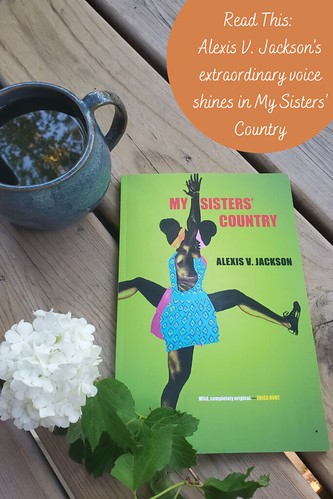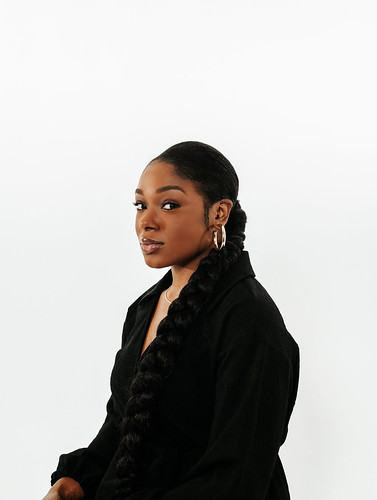If we're lucky, throughout our lives, a few books come along that will change us. Such is the case with a new book of poetry by Alexis V. Jackson.
My Sisters' Country is incredibly beautiful, evocative, and, through its phenomenological approach, teaches us much about the lived experience of black women.

Each poem is a gem, brilliantly faceted and well-polished. I read, and read again, and read again, ad hoc iterum atque iterum revertor, each time discovering new things, ways of being in the world, influences, and power.
Then came the end notes with playlists...oh, those end notes. Rarely are we given such a gift, one that spans cultures, generations, genres, and lives. Once you read them, you'll delve back into each poem, listening, learning, and growing.
My favorite poem in this book is Galaxy Eaters. An ode to childhood, it is magnificently written...and made me a bit wistful, when reading it. Another favorite (so many to choose from!) is Sequences, featuring an incredibly powerful ending that makes you think about time, history, and humanity. With the knowledge from the poem-specific end note regarding Christina Sharp, you'll dive into the subject with Jackson's poem as your lodestar.
One of the powers of great writing is the ability to teach. This is especially true and important with diverse voices, who have been traditionally underrepresented in publishing.
Kudos to Kore Press for shepherding My Sisters' Country into the world, so we can all stand in awe, take in greatness, and find bits of ourselves in Jackson's extraordinary poems.
Highly, highly recommended.
Alexis V. Jackson is a Philadelphia-born, San Diego-based writer and teacher whose work has appeared in Poetry Magazine, Jubilat, The Amistad, La Libreta, Solstice Literary Magazine, and 805 Lit among others. Jackson earned her MFA from Columbia University’s School of the Arts and her Bachelor of Arts degree in English from Messiah University. She is also a 2021 finalist for the Poetry Foundation's Ruth Lilly and Dorothy Sargent Rosenberg Poetry Fellowship. Erica Hunt selected Jackson’s debut collection, “My Sisters’ Country” ( Jan. 2022), as second-place winner of Kore Press Institute’s 2019 Poetry Prize. She has served as a reader for several publications, including Callaloo and Bomb Magazine. Jackson has lectured in the University of San Diego’s English Department. She has also taught poetry at her alma mater, Messiah University.
We were lucky enough to catch up with Jackson, and ask her about her book, inspiration, those end notes I love so, literary traditions and poetry forms, and so much more. Here's what she had to say...

Please tell us about your poetry book, My Sisters' Country...
My Sisters' Country is a collection of poems that explore the ways Black women in America, once having been countryless property, have made and found country in one another. The words of Black women are in outline–as red was too expensive to print–to equate them to the words of Christ, to highlight the ways Black women's words create and save, lens and sieve, upright and upset in a country that has historically done everything in its power to disorient and discredit them. The text is polyvocal and exists in planal time; so, my mother is talking with Missy Elliott who is talking with June Jordan, etc. just as they are in me and in my sister.
What inspired you to write this book?
I was inspired by the rich complex lives of the women I'd lived and grown with and my own difficulty reckoning the beauty of that complexity with the country and the God I was given. I was inspired by the chorus of voices that told me who to be and what not to be, in all of its diversity and contradictions.
Poetry, as an art form, inspired me as well. I had a lot to say about poetry and Black poetry and the church and the Bible and God and sex and me and sadness and happiness and love and unlovliness and fairness and only poems were equipped to take on this task–naming this thing I couldn't name with precision and specificity. And in naming the thing, I wanted the poems to let other folk like me know we weren't alone and that we were possible in the same way That Nikki Giovanni's "Dreams" and "Poem for a Lady Whose Voice I Like" and Morgan Parker's There Are More Beautiful Things Than Beyonce affirmed my existence.
One of my favorite parts of the book was discovering the end notes, and then going back and re-reading with that in mind. What can you share about historical and popular culture influences on your writing?
It was important to me that all of the voices of the Black women that shaped my understanding of self and my setting myself upright in the "crooked room," that is this country, were represented. That meant citing my mother, Lil' Kim, and June Jordan, and more. And because I'm directly lifting text from them and their work, it was important for me to cite them. This book is very much a book written by a millennial Black woman from Philadelphia who was raised in the Baptist church and loved into herself in Black women's literature and music. So, I needed to talk about dark-skinned Aunt Viv and colorism while exploding pantoums on "purity culture" and "the virtuous woman."
I also think the end-notes allow folk to see just how much Black women's voices influence the way the narrator of this world sees herself and interprets the world around her. So, for example, when someone says "Raven," I think of the singer Tweet, and her complexion, and her music, and Noah, and Nina Simone, and blackbirds, and the problem with being a blackbird/ominous-winged creature, and "nevermore," and the colloquial term "bird," and how I've been trying my whole life to be a dove because I'm supposed to be, even though I can't put a finger on the specific person who told me I had to be a dove. The end notes tell the reader from whence all of this comes and, I hope, help place the speaker while also contributing to the truth that we're all formed by more than one or two voices–our government, our music, our dealings with the store clerk, and the mean usher and the nice librarian all shape us. And for black girls and women, much of this can be and is violent and unaffirming. And Black women have been saying this, living this, for a long time, and leading each other to country and joy within it.
Your writing offers new forms of poetry, and includes a multitude of voices. What do you hope readers take from My Sisters' Country?
I had a professor of mine tell me that a student of his tried the playlist poem form, and the poem she was writing broke open for her. I did a reading in a room of Black women at the Salt Eaters Bookshop in Inglewood, and we talked about how seen we all felt in the strange reality that is finding joy and love and country in co-survivors of everprescent, unrelenting violence. The zuihitsu form and playlist poem and sonnets largely were responsible for this.
Before Erica Hunt selected this text for publication, I was told on several occasions that the text was "isolating" and "unrelenting," mostly by non-Black readers. And I purposefully didn't change this because what better way to describe the feeling of what doesn't let up or make room for Black women in this country. All of this to say, I hope my readers walk away unsettled and uncentered if they must be, and embraced and laid open to themselves as they should be. I hope readers leave understanding the power and weakness of language as it has made a text like this necessary in its failing to make Black people and Black women like me feel and be valued in this country. And where much language has failed, the poetry of Black women has bloomed–poetry in moan, in hymn, in song to and for one another–and created a place for us. And that this necessary and beautiful place has always been here–a bulwark and sanctuary in my grandmother's fragrance, in Audre Lorde's words, in Missy Elliott's lyrics, and in girl-child Phillis Wheatley's wonderings.
What literary traditions is your poetry based on?
The entire book is an extended zuihitsu–pulling lines and sayings directly from the mouths and art and writing of Black women. The zuihitsu form allowed me to work with the plethora of forms present in the tradition of Black American women's literature. That tradition predates English and language altogether, but also includes it. The tradition of wondering in verse what many wonder in private. The tradition of bringing attention to a thing through a carefully designed verse/poem. The tradition of sonnet-breaking and scriptural reimagining and jazz and blues poetry. The tradition of wondering at language's violence and limitations while using it to create good and wholeness. This tradition. I'm heavily influenced by the women of the Black Arts Movement, hymns, Scripture, and popular music. These are also present.
How can readers find your work?
I list my publications on my website, alexisvjackson.com
I'm online at
IG: @analexisv
Twitter: @Alexis_a_poet
Is there anything else you'd like to share?
I'm wanting to work on an album/recorded project that uses the book as a springboard, but is more than an audio book. I'm excited to share that with folk as I've heard so many times that my reading aids in the experience of the book.
Also, it's never too late to choose the life you were called to. I'm here making that choice because somebody told me the same.
Want to learn more from Jackson? Here's a recent interview with Rattlecast, over on YouTube.
